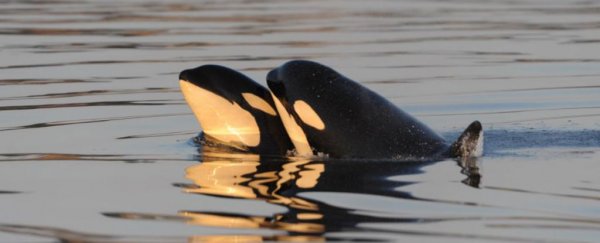Menopause is an inevitable part of human biology, but it's actually incredibly rare in the animal kingdom.
Apart from humans, only two known species go through menopause in the wild – orcas and short-finned pilot whales – and scientists might finally have an explanation for this evolutionary mystery.
Researchers have never fully understood why the phenomenon occurs only in humans and whales, since other species reproduce throughout their lives.
But now a study led by the University of Exeter in the UK has found evidence for what could be behind menopause in orcas: female animals stop reproducing when they're older because their calves can't compete with offspring born to their adult daughters.
In other words, a kind of mother-daughter conflict ensues when older orcas reproduce alongside their fertile daughters once they hit sexual maturity.
With only so much food and care to go around in the pod, calves born to grandmother-age whales don't appear to survive as well as offspring born to younger mothers.
But why? The evolved trait may have come about due to the way orcas organise their social structure.
Female orcas start reproducing at about 15 years old, then stop in their 30s or 40s. And while many male orcas don't live beyond their 30s, post-reproductive females survive for much longer, and can live to more than 90.
These older matriarchs take the lead in their pods, helping their extended families to find food, but that broad and inclusive caring role appears to come at a cost.
When the researchers analysed more than 40 years of orca data gathered by the US Centre for Whale Research and Fisheries and Oceans Canada, they found that the mortality of older mothers' offspring was 1.7 times higher than that of younger mothers' calves in the pod.
That's a pretty stark imbalance, and it's the first direct evidence to support what's called the "reproductive conflict hypothesis" - a model put forward as an explanation of mammalian menopause in 2008.
The hypothesis suggests that older females stop breeding due to the costs of reproductive competition with their daughters, and the benefits of grandmothering.
In the case of whales, the researchers behind the new study think this kind of cost/benefit analysis explains from an evolutionary perspective why it doesn't make sense for orcas to just breed as much as possible while they're alive – even though that approach could work for other animals.
"It's easy to think that an older female will pass on their genes better by continuing to give birth in late life," says one of the team, behavioural ecologist Daniel Franks from the University of York in the UK.
"But our new work shows that if an old female killer whale reproduces, her late-life offspring suffer from being out-competed by her grandchildren. This, together with her investment in helping her grandchildren, can explain the evolution of menopause."
But why are the late-life offspring out-competed by the grandchildren in the first place? The team thinks it's to do with how personally invested mother orcas are in the welfare of the pod, which comes down to how the whales mate.
When orcas breed, females mate with whales from other families, then return to their own pod. This means that young orcas grow up without their fathers being around, meaning their level of relatedness to the rest of the group starts off relatively low.
But as female orcas age, and start contributing their own offspring to the pod, their kinship ties to the rest of the group become stronger, which could have an effect on how food resources are allocated among the brood.
"It may be that older females are more likely to share, and younger females are less likely to share food," researcher Darren Croft from the University of Exeter told Nell Greenfieldboyce at NPR.
The end result is that as grandmothers are more likely to share food around, their own newly born offspring may receive less.
Meanwhile, younger mothers that haven't developed those generous sharing traits will secure food specifically for consumption solely by their children, which helps them to survive better in the wild.
"It's not that older mothers are bad mothers, that they're not able to raise their calves as younger mothers," says Croft.
"It's that when they enter into this competition with their daughters, they lose out and their calves are more likely to die."
While at this stage the new research only provides evidence that the reproductive conflict hypothesis extends to orcas, the team thinks the model could also underpin human menopause – but it will fall to future research to explore the possibility further.
"There isn't an overwhelming amount of empirical evidence in humans that older women really suffer higher costs in reproductive conflict with younger women," menopause researcher Rebecca Sear from the London School of Hygiene and Tropical Medicine in the UK, who wasn't involved with the study, told Ed Yong at The Atlantic.
"[B]ut that may be because few studies have actually tested for this yet."
The findings are reported in Current Biology.
